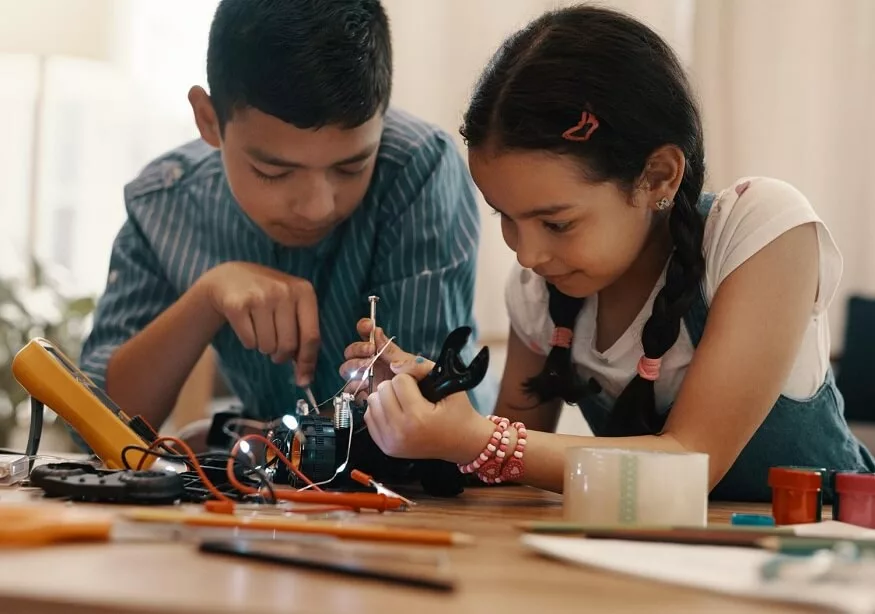Project-Based Learning (PBL) transcends traditional teaching methods, immersing students in real-life challenges that ignite their curiosity and creativity. In this article, we embark on a journey to understand the essence of Project-Based Learning, exploring a myriad of ideas, activities, and strategies that engage children and bring learning to life.
Project-Based Learning
Project-based learning is not just a teaching method; it’s a philosophy that embraces the belief that education should go beyond rote memorisation and standardised testing. At its core, PBL encourages students to delve into meaningful, inquiry-based projects that mirror authentic challenges faced in the real world.
The primary objective of Project-Based Learning is to shift from a teacher-centric model to a student-centric one. Rather than passively receiving information, students actively engage with hands-on projects that demand critical thinking, collaboration, and problem-solving skills.
Also Read: What is Rote learning? Meaning, Types, Examples, Advantages and Disadvantages
Key Strategies for Successful Project-Based Learning
1. Begin with a Thought-Provoking Question or Problem
The journey of Project-Based Learning often commences with a compelling question or a real-world problem. This catalyses student curiosity and inquiry. The question should be designed to spark interest, prompt exploration, and set the stage for a meaningful project.
2. Create an Authentic Context
Root the project in a context that mirrors real-life scenarios. Whether it’s addressing environmental issues, solving community challenges, or exploring historical events, providing an authentic context enhances students’ connection to the project, making it more relevant and engaging.
3. Foster Student Collaboration
Collaboration is at the heart of Project-Based Learning. Encourage students to work together in teams, assigning specific roles and responsibilities. Collaboration not only nurtures teamwork and communication skills but also exposes students to diverse perspectives and ideas.
4. Empower Student Choice and Voice
Grant students the autonomy to make decisions about their projects. Offering choices in topics, methods, or final presentations enhances a sense of ownership and personalisation. When students feel that their voices matter, motivation, and engagement naturally follow.
5. Integrate Technology and Diverse Resources
Leverage technology and a variety of resources to enrich the project experience. Whether using digital tools, conducting interviews, or incorporating multimedia elements, integrating diverse resources supports a comprehensive and engaging learning experience.
6. Facilitate Regular Reflection
Reflection is a crucial component of Project-Based Learning. Regular opportunities for students to reflect on their progress, challenges faced, and lessons learned deepen their understanding of both the content and the learning process. It encourages metacognition and self-awareness.
7. Culminate with a Showcase or Presentation
The journey of Project-Based Learning finds its completion in a showcase or presentation. This public platform provides students with the opportunity to share their findings, solutions, or creations with a wider audience. Presentations not only reinforce communication skills but also instil a sense of pride and accomplishment.
Also Read: Benefits of Mind Mapping for Learning and Creativity For Preschoolers
Engaging Project-Based Learning Activities
- Design a Sustainable Community:
Challenge students to design a sustainable community. This project incorporates elements of science, geography, and social responsibility. Students can explore concepts of renewable energy, waste management, and green spaces, applying their knowledge to create a blueprint for an environmentally conscious community.
- Historical Inquiry Project:
Dive into history through a research-based project. Students can choose a historical event or period to explore, utilising primary sources, creating timelines, and presenting their findings in creative ways such as skits, documentaries, or interactive exhibits.
- Entrepreneurship Challenge:
Stimulate entrepreneurial thinking by tasking students with creating and launching a business concept. This project integrates elements of business studies, mathematics, and creativity. Students can develop business plans, design marketing strategies, and even participate in a mock ‘Shark Tank’ presentation.
- Civic Engagement Project:
Empower students to address civic issues in their community. Whether it’s advocating for cleaner parks, addressing homelessness, or promoting awareness about local environmental challenges, this project encourages social responsibility and community involvement.
- Literary Adaptation Project:
Combine literature with creative expression by challenging students to adapt a piece of literature into a different medium. This could involve turning a novel into a play, creating a graphic novel version of a poem, or even composing a song inspired by a short story.
Also Read: The Benefits of Cooperative Learning in the Classroom
Project-Based Learning in Progressive Schools
1. Ron Berger’s Expeditionary Learning Schools
Ron Berger, an advocate for Project-Based Learning, played a pivotal role in the creation of Expeditionary Learning Schools. These schools prioritise hands-on projects that encompass interdisciplinary learning, fieldwork, and community engagement, leading to significant success stories.
2. High Tech High in San Diego
High Tech High is a network of charter schools in San Diego known for its innovative approach to education. These schools integrate Project-Based Learning across various subjects, allowing students to work on projects that mirror real-world challenges. The approach has garnered attention for its success in fostering critical thinking and creativity.
3. Buck Institute for Education (BIE)
The Buck Institute for Education (BIE) stands as a pioneer in promoting Project-Based Learning. BIE offers an array of project ideas, planning tools, and professional development resources for educators to seamlessly integrate PBL into their classrooms, ensuring a meaningful and effective learning experience.
Overcoming Challenges in Implementing Project-Based Learning
While Project-Based Learning holds immense promise, implementing it may present challenges. Here are strategies to overcome common hurdles:
- Time Management:
Address time constraints by integrating shorter, focused projects that align with specific learning objectives. Effective planning and organisation can maximise instructional time while still incorporating meaningful projects.
- Assessment and Evaluation:
Develop rubrics that assess both content knowledge and essential skills such as collaboration, critical thinking, and communication. Provide continuous feedback throughout the project for ongoing improvement.
- Balancing Curriculum Requirements:
Align projects with learning standards and curricular goals to demonstrate integration within the broader educational framework. This ensures that essential content is covered while allowing for exploration and creativity.
- Student Engagement:
Sustain student engagement by choosing projects that resonate with their interests. Incorporate elements of choice, variety, and real-world relevance to keep students invested in the learning process.
- Resource Constraints:
Overcome limited resources by seeking creative solutions, such as partnering with local businesses or leveraging community resources. Embrace low-tech projects that encourage resourcefulness and innovation.
Also Read: Experiential Learning Theory Meaning and Examples
Incorporating Project-Based Learning into the classroom is not just an educational strategy; it’s a mindset shift that nurtures lifelong learners. By engaging students in authentic challenges, PBL goes beyond transmitting information, fostering a deep understanding of content and developing critical life skills. EuroSchool embraces the power of Project-Based Learning as it is an investment in the future.











